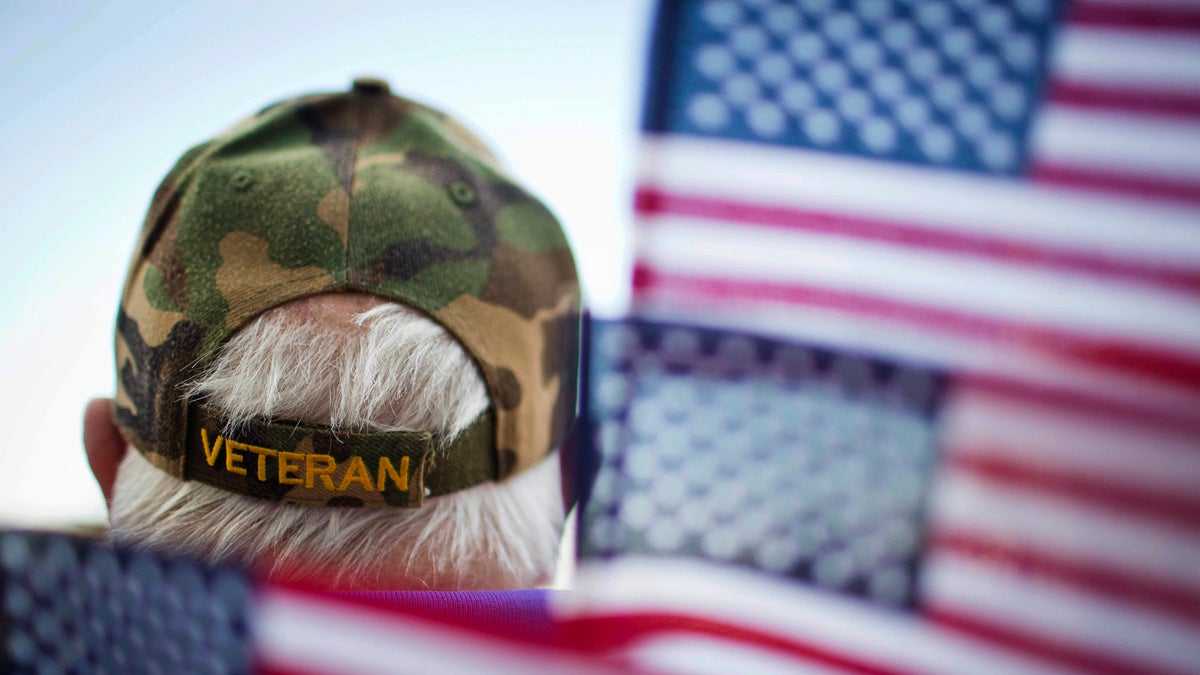Average Americans lack common bond of service against evil abroad

Frank Lindsey is surrounded by flags as he attends a 2014 Veterans Day parade in Montgomery, Ala. (AP Photo/Brynn Anderson)
The majority of today’s obituaries describe members of the Greatest Generation, brave men and women who defended our country by defeating the Nazis in World War II. What a different world we have today.
If your college sends you an alumni magazine, you may read it the same way I do. You start with the class notes for news of your friends.
Over time, your class, listed in chronological order, slowly moves from the back of the list, to the middle, to the front. Inevitably, your classmates start falling out of the class notes section altogether, and wind up in the obituaries.
By middle age, you find yourself spending as much time reading the obituaries as the class notes. For Baby Boomers like me, that means transitioning from “Don’t trust anyone over 30!” to “Will you still feed me when I’m 64?”
What a difference a generation makes
The majority of today’s obituaries, from college magazines to local newspapers, describe members of the Greatest Generation. These brave men (and some women) defended our country, and all of western civilization, by defeating the Nazis in World War II.
What’s striking about these obituaries is that, no matter what status these people achieved in life, their military service is noted with pride in each and every obituary.
Here are a few examples from just one issue of my college alumni magazine:
J.A., class of 1940, a small business owner: “He served in the U.S. Navy during World War II on the USS Franks, mostly in the Pacific.”
P.D., class of 1948, a family doctor: “He served in World War II with the 66th Infantry Division of General Patton’s 3rd Army.”
R.S., class of 1948, a government employee: “A veteran of the U.S. Navy, he served in the Pacific Theatre during World War II.”
R.G., class of 1949, a used car salesman: “He served in the U.S. Army Air Corps before attending college.”
L.L., class of 1950, a minor league baseball player who was offered a contract with the Phillies: “He left college to join the Navy during World War II.”
These obituaries provide a time capsule that takes us back to the life of our country during the 1940s. What is striking is the common thread of military service, and pride in that service, that created a lifelong bond across an otherwise diverse generation of young men.
Women served as well, as nurses and Women’s Army Corps volunteers. At home, women like Rosie the Riveter filled the void by taking on “men’s” factory jobs. Women volunteered for the Red Cross, organized blood drives and rolled bandages. Everyone, from young to old, was involved in the war effort, from kids collecting cans and tires to families tightening their belts to find a few bucks to buy war bonds.
What a different world we have today. We Baby Boomers protested our war in Vietnam with cries of “Hell no, we won’t go.” We fought to have the voting age lowered to 18, because we didn’t want to fight a war we couldn’t have a say in. Our parents held their breath as the draft numbers were chosen — the only lottery in history that no one wanted to win.
No bond of service
Now we have a volunteer army, with fewer than 1 percent of Americans in the service. The average American does not know a single person in the armed forces. I recently met Siobhan Fuller-McConnell, one of the mothers profiled in a new book by Dava Guerin and Kevin Ferris called “Unbreakable Bonds.” Their book tells the true stories of 10 mothers who sacrifice everything (their personal lives, their jobs, and sometimes their marriages) to care for their horribly injured sons at Walter Reed National Military Medical Center.
I asked Siobhan if she perceived a disconnect between today’s average American family and the families of U.S. veterans. She told me this heartbreaking story: “When my son died, I was designated a Gold Star mother. Many people, including one Army recruiter, actually congratulated me on my new title. They didn’t realize that my Gold Star meant that I had lost my son.”
We don’t have the generational bond of service to country today that we had 70 years ago. And yet, with the rise of ISIS, the threat to global security is as great as — or greater — than it was when Hitler sought to rule the world.
How much longer can we stand by as American citizens are beheaded? What about the systematic murder of women, children, Coptic Christians, Jews, journalists, missionaries and other innocent civilians? Or the extermination of entire villages of ethnic and religious minorities? How do we react to the news that ISIS now controls an area larger than Great Britain?
Will we find again that stirring sense of national purpose? Will we find again the will to oppose evil with actions, not words? Will we dare say: ISIS-inspired Islamist terrorists are seeking to take over the world by creating an international caliphate — and, so far, they are winning?
When all is said and done, what will our own obituaries say? How will each of us be remembered?
WHYY is your source for fact-based, in-depth journalism and information. As a nonprofit organization, we rely on financial support from readers like you. Please give today.

